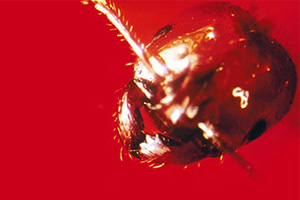
Queensland must rebuild run-down biosecurity system
Queensland’s run-down biosecurity system must be rebuilt to protect people, the environment and agriculture from future pests and diseases.

Queensland’s run-down biosecurity system must be rebuilt to protect people, the environment and agriculture from future pests and diseases.

The release of a carp-specific herpes virus to knock down Australia’s worst freshwater pest, the European Carp, could be a wasted opportunity unless it is supported by river recovery actions.

Leading conservation organisations are urging the NSW Government to fully implement the recommendations of the NSW Natural Resources Commission’s pest animal management review.

A new partnership between conservation groups is setting out to protect wildlife and restore ecosystems on Australian islands.
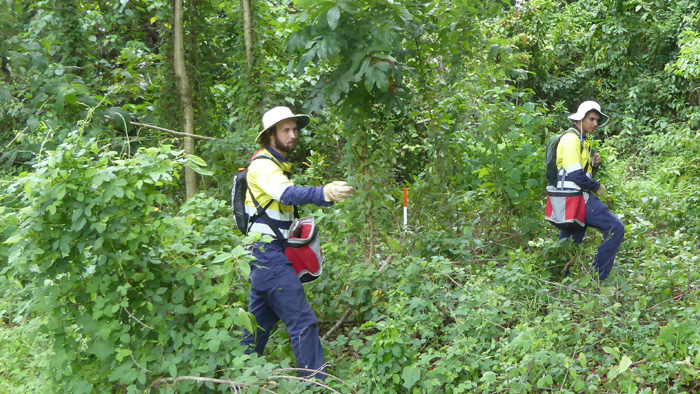
There is new hope the Queensland and federal governments will come on board to tackle yellow crazy ants threatening to destroy Australia’s wet tropics rainforests.
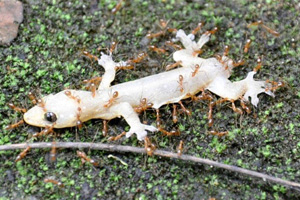
Four North Queensland champions have been acknowledged with Froggatt Awards for their exceptional efforts in raising awareness about the threat of yellow crazy ants and helping to eradicate the ant from the Wet Tropics World Heritage Area.
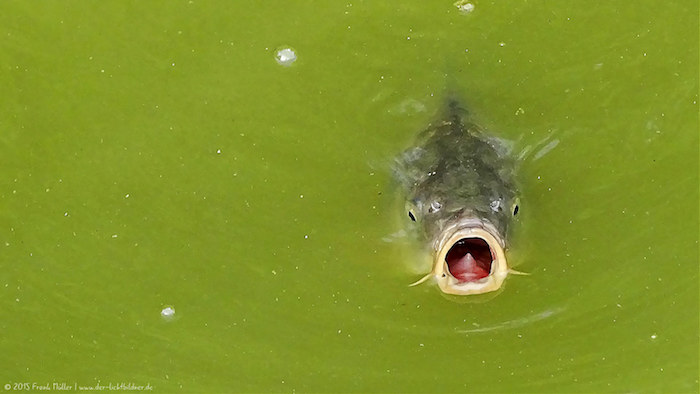
A coalition of industry and environment groups have come together to call on State and Federal governments to take action against Australia’s worst freshwater aquatic pest, the European carp.

Lampooned for threatening to euthanise actor Johnny Depp’s Yorkshire terriers earlier this year, federal minister Barnaby Joyce has been recognised for defending Australia’s tough quarantine laws.
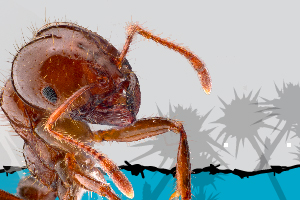
The rest of Australia must back a long-term plan to help Queensland eradicate vicious red fire ants.
The NSW Biosecurity Bill, introduced into Parliament this week, is missing important accountability measures agreed by the NSW Government when the Bill was first introduced last year.
Feral animals, weeds and diseases will continue to push Australian species towards extinction unless the Federal Government ramps up efforts to stamp out new threats before they take hold.

The Tasmanian Government must act now to stop feral deer numbers exploding or else the agricultural and environmental damage they cause will quickly become overwhelming.
Australia is ill-prepared, ill-equipped and neglectful when it comes to protecting its borders from devastating new invasive species.
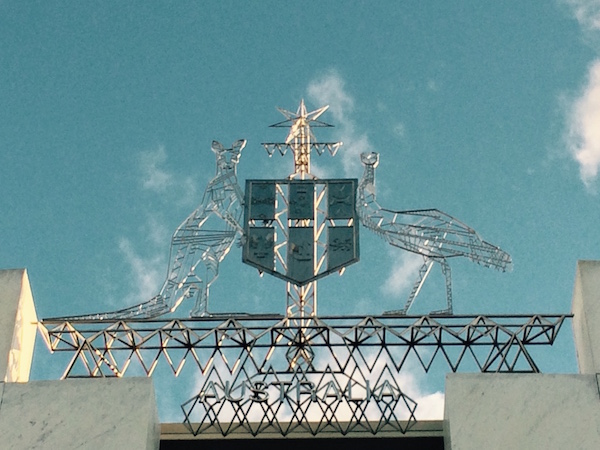
The passage of the Biosecurity Bill through the Senate today marks a squandered reform opportunity and a refusal to address deficiencies that would stem the flow of dangerous invasive species into Australia.
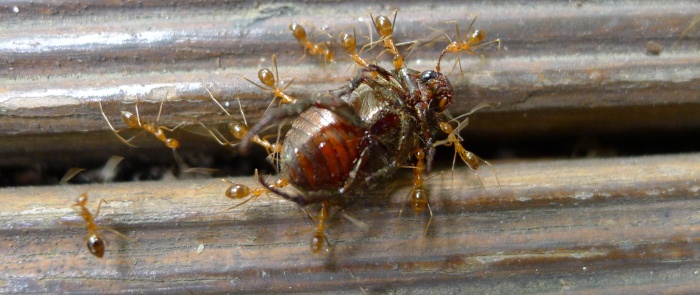
Invading ant supercolonies are threatening to turn Australia into an environmental, agricultural and social basketcase, the Invasive Species Council warned today.

Queensland’s run-down biosecurity system must be rebuilt to protect people, the environment and agriculture from future pests and diseases.

The release of a carp-specific herpes virus to knock down Australia’s worst freshwater pest, the European Carp, could be a wasted opportunity unless it is supported by river recovery actions.

Leading conservation organisations are urging the NSW Government to fully implement the recommendations of the NSW Natural Resources Commission’s pest animal management review.

A new partnership between conservation groups is setting out to protect wildlife and restore ecosystems on Australian islands.

There is new hope the Queensland and federal governments will come on board to tackle yellow crazy ants threatening to destroy Australia’s wet tropics rainforests.

Four North Queensland champions have been acknowledged with Froggatt Awards for their exceptional efforts in raising awareness about the threat of yellow crazy ants and helping to eradicate the ant from the Wet Tropics World Heritage Area.

A coalition of industry and environment groups have come together to call on State and Federal governments to take action against Australia’s worst freshwater aquatic pest, the European carp.

Lampooned for threatening to euthanise actor Johnny Depp’s Yorkshire terriers earlier this year, federal minister Barnaby Joyce has been recognised for defending Australia’s tough quarantine laws.

The rest of Australia must back a long-term plan to help Queensland eradicate vicious red fire ants.
The NSW Biosecurity Bill, introduced into Parliament this week, is missing important accountability measures agreed by the NSW Government when the Bill was first introduced last year.
Feral animals, weeds and diseases will continue to push Australian species towards extinction unless the Federal Government ramps up efforts to stamp out new threats before they take hold.

The Tasmanian Government must act now to stop feral deer numbers exploding or else the agricultural and environmental damage they cause will quickly become overwhelming.
Australia is ill-prepared, ill-equipped and neglectful when it comes to protecting its borders from devastating new invasive species.

The passage of the Biosecurity Bill through the Senate today marks a squandered reform opportunity and a refusal to address deficiencies that would stem the flow of dangerous invasive species into Australia.

Invading ant supercolonies are threatening to turn Australia into an environmental, agricultural and social basketcase, the Invasive Species Council warned today.

Queensland’s run-down biosecurity system must be rebuilt to protect people, the environment and agriculture from future pests and diseases.

The release of a carp-specific herpes virus to knock down Australia’s worst freshwater pest, the European Carp, could be a wasted opportunity unless it is supported by river recovery actions.

Leading conservation organisations are urging the NSW Government to fully implement the recommendations of the NSW Natural Resources Commission’s pest animal management review.

A new partnership between conservation groups is setting out to protect wildlife and restore ecosystems on Australian islands.

There is new hope the Queensland and federal governments will come on board to tackle yellow crazy ants threatening to destroy Australia’s wet tropics rainforests.

Four North Queensland champions have been acknowledged with Froggatt Awards for their exceptional efforts in raising awareness about the threat of yellow crazy ants and helping to eradicate the ant from the Wet Tropics World Heritage Area.

A coalition of industry and environment groups have come together to call on State and Federal governments to take action against Australia’s worst freshwater aquatic pest, the European carp.

Lampooned for threatening to euthanise actor Johnny Depp’s Yorkshire terriers earlier this year, federal minister Barnaby Joyce has been recognised for defending Australia’s tough quarantine laws.

The rest of Australia must back a long-term plan to help Queensland eradicate vicious red fire ants.
The NSW Biosecurity Bill, introduced into Parliament this week, is missing important accountability measures agreed by the NSW Government when the Bill was first introduced last year.
Feral animals, weeds and diseases will continue to push Australian species towards extinction unless the Federal Government ramps up efforts to stamp out new threats before they take hold.

The Tasmanian Government must act now to stop feral deer numbers exploding or else the agricultural and environmental damage they cause will quickly become overwhelming.
Australia is ill-prepared, ill-equipped and neglectful when it comes to protecting its borders from devastating new invasive species.

The passage of the Biosecurity Bill through the Senate today marks a squandered reform opportunity and a refusal to address deficiencies that would stem the flow of dangerous invasive species into Australia.

Invading ant supercolonies are threatening to turn Australia into an environmental, agricultural and social basketcase, the Invasive Species Council warned today.
Get our blog the Feral Herald delivered to your inbox.
Our protected areas are being trashed, trampled, choked and polluted by an onslaught of invaders. Invasive species are already the overwhelming driver of our animal extinction rate, and are expected to cause 75 of the next 100 extinctions.
But you can help to turn this around and create a wildlife revival in Australia.
From numbats to night parrots, a tax-deductible donation today can help defend our wildlife against the threat of invasive weeds, predators, and diseases.
As the only national advocacy environment group dedicated to stopping this mega threat, your gift will make a big difference.
A silent crisis is unfolding across Australia. Every year, billions of native animals are hunted and killed by cats and foxes. Fire ants continue to spread and threaten human health. And the deadly strain of bird flu looms on the horizon. Your donation today will be used to put the invasive species threat in the media, make invasive species a government priority, ensure governments take rapid action to protect nature and our remarkable native wildlife from invasives-led extinction, death and destruction.
If you are having trouble submitting a form, please read this guide.
Please fill out the following form and one of our team will be in contact to assist as soon as possible. Please make sure to include any helpful information, such as the device you were using (computer, tablet or mobile phone) and if known, your browser (Mozilla Firefox, Chrome, Safari etc)
"*" indicates required fields
Dear Project Team,
[YOUR PERSONALISED MESSAGE WILL APPEAR HERE.]
I support the amendment to the Kosciuszko National Park Wild Horse Heritage Management Plan to allow our incredible National Parks staff to use aerial shooting as one method to rapidly reduce feral horse numbers. I want to see feral horse numbers urgently reduced in order to save the national park and our native wildlife that live there.
The current approach is not solving the problem. Feral horse numbers have rapidly increased in Kosciuszko National Park to around 18,000, a 30% jump in just the past 2 years. With the population so high, thousands of feral horses need to be removed annually to reduce numbers and stop our National Park becoming a horse paddock. Aerial shooting, undertaken humanely and safely by professionals using standard protocols, is the only way this can happen.
The government’s own management plan for feral horses states that ‘if undertaken in accordance with best practice, aerial shooting can have the lowest negative animal welfare impacts of all lethal control methods’.
This humane and effective practice is already used across Australia to manage hundreds of thousands of feral animals like horses, deer, pigs, and goats.
Trapping and rehoming of feral horses has been used in Kosciuszko National Park for well over a decade but has consistently failed to reduce the population, has delayed meaningful action and is expensive. There are too many feral horses in the Alps and not enough demand for rehoming for it to be relied upon for the reduction of the population.
Fertility control as a management tool is only effective for a small, geographically isolated, and accessible population of feral horses where the management outcome sought is to maintain the population at its current size. It is not a viable option to reduce the large and growing feral horse population in the vast and rugged terrain of Kosciuszko National Park.
Feral horses are trashing and trampling our sensitive alpine ecosystems and streams, causing the decline and extinction of native animals. The federal government’s Threatened Species Scientific Committee has stated that feral horses ‘may be the crucial factor that causes final extinction’ for 12 alpine species.
I recognise the sad reality that urgent and humane measures are necessary to urgently remove the horses or they will destroy the Snowies and the native wildlife that call the mountains home. I support a healthy national park where native species like the Corroboree Frog and Mountain Pygmy Possum can thrive.
Dear Project Team,
[YOUR PERSONALISED MESSAGE WILL APPEAR HERE.]
I support the amendment to the Kosciuszko National Park Wild Horse Heritage Management Plan to allow our incredible National Parks staff to use aerial shooting as one method to rapidly reduce feral horse numbers. I want to see feral horse numbers urgently reduced in order to save the national park and our native wildlife that live there.
The current approach is not solving the problem. Feral horse numbers have rapidly increased in Kosciuszko National Park to around 18,000, a 30% jump in just the past 2 years. With the population so high, thousands of feral horses need to be removed annually to reduce numbers and stop our National Park becoming a horse paddock. Aerial shooting, undertaken humanely and safely by professionals using standard protocols, is the only way this can happen.
The government’s own management plan for feral horses states that ‘if undertaken in accordance with best practice, aerial shooting can have the lowest negative animal welfare impacts of all lethal control methods’.
This humane and effective practice is already used across Australia to manage hundreds of thousands of feral animals like horses, deer, pigs, and goats.
Trapping and rehoming of feral horses has been used in Kosciuszko National Park for well over a decade but has consistently failed to reduce the population, has delayed meaningful action and is expensive. There are too many feral horses in the Alps and not enough demand for rehoming for it to be relied upon for the reduction of the population.
Fertility control as a management tool is only effective for a small, geographically isolated, and accessible population of feral horses where the management outcome sought is to maintain the population at its current size. It is not a viable option to reduce the large and growing feral horse population in the vast and rugged terrain of Kosciuszko National Park.
Feral horses are trashing and trampling our sensitive alpine ecosystems and streams, causing the decline and extinction of native animals. The federal government’s Threatened Species Scientific Committee has stated that feral horses ‘may be the crucial factor that causes final extinction’ for 12 alpine species.
I recognise the sad reality that urgent and humane measures are necessary to urgently remove the horses or they will destroy the Snowies and the native wildlife that call the mountains home. I support a healthy national park where native species like the Corroboree Frog and Mountain Pygmy Possum can thrive.